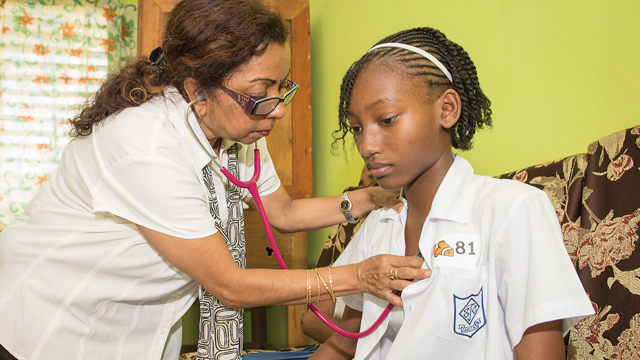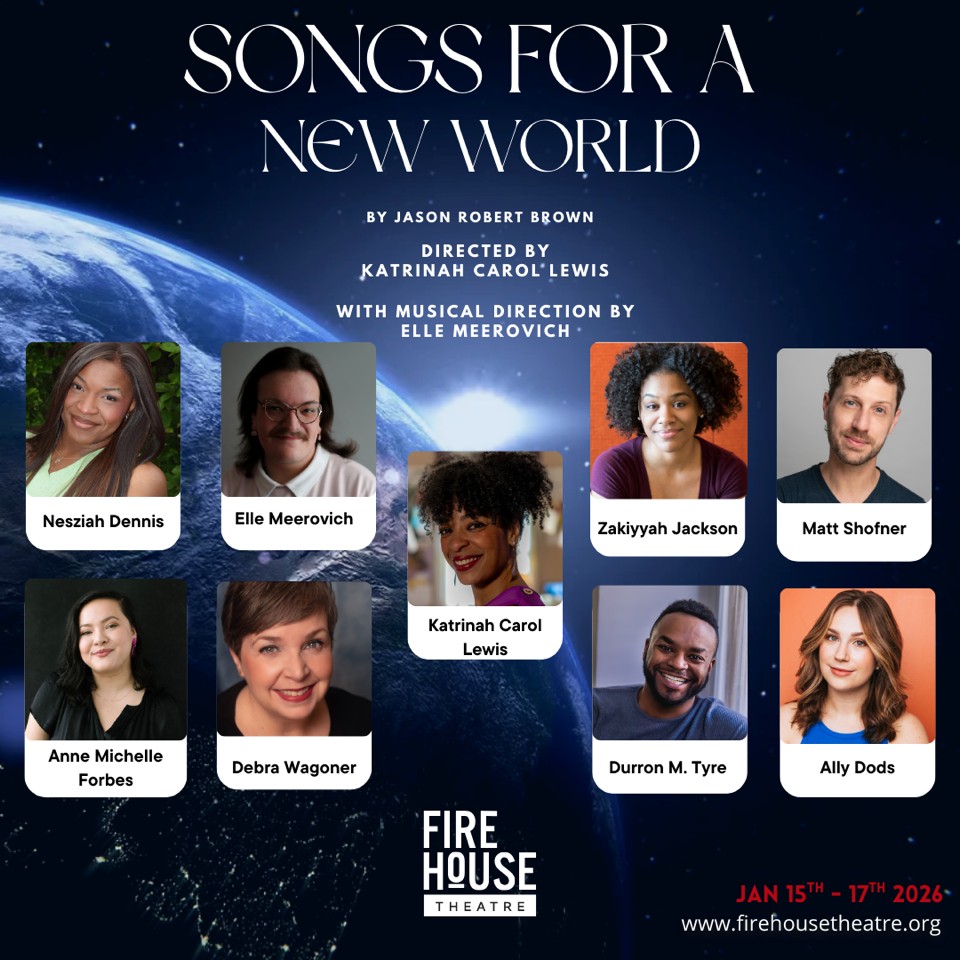Moms Beatriz and Marleny have more in common than just their Guatemalan heritage. They share a new sense of hope for their children’s health.
That’s something they didn’t have before learning about Richmond-based World Pediatric Project (WPP), a nonprofit organization which provides access to lifesaving critical care to children regardless of geography.
Each of these soft-spoken women has a child born with a life-threatening condition requiring specialized medical expertise that is nonexistent in Guatemala.
Petite and humble, Beatriz and Marleny traveled separately with their children to Richmond with the help of WPP several months ago for their children’s surgeries at Children’s Hospital of Richmond at VCU. Beatriz’s 11-year-old daughter Dania is by her mom’s side in the kitchen of the Ronald McDonald House on Monument Avenue, entertaining Marleny’s 11-month-old son Jesus. Dania flashes a broad smile at Jesus who returns the gesture with a sweet squeal for emphasis.
World Pediatric Project has brought Dania and her mom to Richmond three times for surgery. Born with a rare condition called Crouzon syndrome – a genetic disorder characterized by the premature fusion of certain skull bones which prevents the skull from growing normally and affects the shape of the head and face – Dania had her first craniofacial surgery in 2010 to expand her skull and make more room for her brain.
After her second surgery, she was outfitted with headgear that included expanders to help shape her skull. Her most recent surgery helped expand her jaw, bringing her face forward to create a rounder profile.
Before Beatriz was connected with WPP, all of her hope was gone. “We didn’t have enough money to get to the Guatemalan capital for even the basic studies needed to figure out what was wrong,” she says. “Our whole family was very sad.”
Doctors told Beatriz if Dania’s condition wasn’t corrected soon, there was a high risk her child’s eyes would pop out from their sockets because of the way her skull was growing. “Our whole family felt anguish thinking there was no hope for Dania,” Beatriz says.
She was relieved when she learned WPP could bring Dania to Richmond where surgeons could correct the condition. Since Dania’s surgeries, Beatriz has seen a significant difference in her daughter’s level of apprehension. “She had been told if she even walked forcefully or ran, her eyes would pop out,” Beatriz says. “Now she can run and play normall… she’s not afraid.”
Being in Richmond and working with WPP has been “marvelous, marvelous,” Beatriz says, adding she recognizes how much help her daughter has been given. “We’ve had wonderful experiences because people have been so generous.”
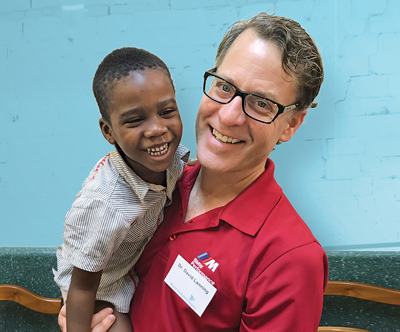
Marleny feels the same level of gratitude. When her son Jesus was born, she felt helpless and hopeless. He needed craniofacial surgery to repair a bilateral cleft lip and cleft palate. Due to his condition, he wasn’t getting the nutrition he needed because he was unable to breastfeed or drink from a regular bottle. He was also having issues with his eyes, which were overly exposed and unprotected.
Like Beatriz, Marleny and her family lived far away from Guatemala City, making it impossible to get the medical help Jesus needed. “Even the doctors in the hospital where he was born said he wouldn’t survive, and if he lived more than a week, it would be a miracle,” she says.
Jesus first had surgery in Richmond to close the eyelid to help protect his eye. Another surgery repaired the hole in his palate completely.
Marleny was overwhelmed when she saw her baby boy after his surgery. “I thought it would be tiny steps at a time,” she says. “I didn’t realize it would be possible to do so much at once. This was like a miracle.”
Families Who Need Help World Pediatric Project
World Pediatric Project has three core program areas to help children in need. The organization has international surgical and diagnostic teams that travel to eight partner countries to perform in-country services as well as a U.S. referral program for children with complex or urgent conditions to come to the U.S. for treatment.
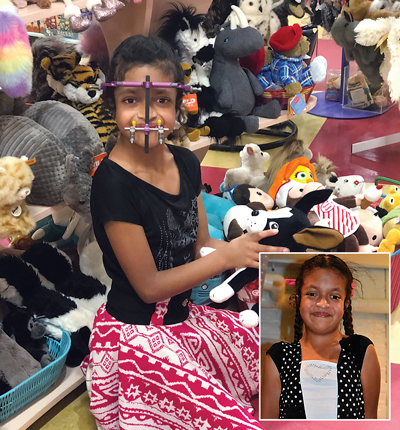
The organization also has training programs to help indigenous doctors and nurses with the skills and resources needed to improve future health outcomes for children in their home countries.
Most of WPP’s cases are identified through the organization’s missions or in-country partners. “I work mostly with our partners in-country to get information so surgeons can have a full picture of the case to decide if it is appropriate for them and the hospital,” says Pilar Waters, program director, U.S. referrals. “I also work with the medical review committee to decide if it is a good case to bring to the U.S.”
Waters and her staff coordinate and prepare patients and their families for the trip to the U.S., working with embassies to obtain passports or Visas and talking to families about the culture and communal living they will encounter. The bilingual team is on call twenty-four hours a day, seven days a week.
“We encourage the families and empower them to be advocates for their child. We offer emotional support,” says Waters. “We make sure all our families are accompanied on all their appointments and on the day of surgery. We also go grocery shopping for them and make sure they have fun things to do while they are here.”
Student interns from University of Richmond and Virginia Commonwealth University, as well as area church groups, spend time with the visiting families. “We couldn’t do what we do without our volunteers,” Waters says.
World Pediatric Project usually has six to eight kids in town at any given time. As a way to cut down expenses, approximately 99 percent of the airfare used to bring patients and their families to the U.S. is obtained through Mercy Medical Angels, a nonprofit that provides free transportation to and from medical care for qualifying individuals and their families.
The children who are flown to the U.S. have a variety of serious medical challenges. In 2011, however, the WPP wasn’t certain it could help a family when representatives from the Dominican Republic told the organization about Maria and Teresa, conjoined twins who were around a year old.
“My first response was, ‘We can’t do that,’” says WPP’s CEO Susan Rickman.
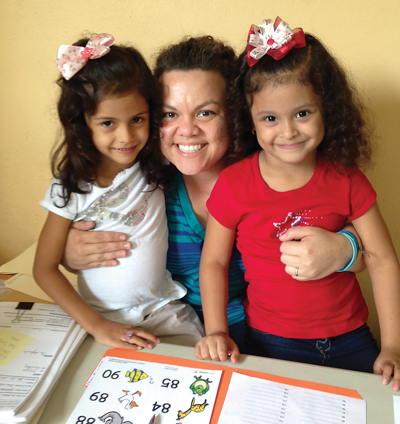
But WPP Medical Director David Lanning, MD, co-surgeon-in-chief at Children’s Hospital of Richmond at VCU, had a different answer when Rickman called him. “He said, ‘Let’s see. I think we can help,’” Rickman recalls. “He and I met with VCU administrators, and they agreed the surgery had to be done. It was a miracle.”
A team of forty-five physicians and pediatric subspecialists volunteered their time for the complex, 20-hour procedure to separate the girls. The twins were joined at the lower chest and abdomen and shared a liver, part of their biliary system, pancreas glands, and the first part of the small intestine or duodenums.
“The girls are seven years old now, in school, and living completely normal lives,” says Rickman.
Starting a Lifesaving Mission
World Pediatric Project traces its roots back to its founder, Julian Metts, Jr., a retired orthodontist and a South Richmond Rotary member. After going on mission trips with the Rotary in the 1990s and seeing so many children in need of medical care, he knew a larger initiative was needed to provide services to children who couldn’t tap into or afford medical help in their native countries.
Dr. Metts wanted to bring care to them through the coordination of multi-specialty surgery teams and partner hospitals in the U.S. In 2001, he opened the nonprofit International Hospital for Children here in Richmond and hired Rickman to oversee the organization.
“Today, we have twenty-two hospitals that partner with us and fifty-five surgical and diagnostic teams going out to Central America and the Caribbean,” says Rickman, whose office is filled with mementos from trips to partner countries and photos of the children she has met along the way. “Our ongoing care has evolved into developing programs for helping the children of today and preparing local medical care providers to care for the children of tomorrow.”
The organization rebranded to World Pediatric Project in 2010 after merging with another small organization in St. Louis, Missouri, where it still has an office with twelve employees, in addition to the Richmond headquarters and its team.
Over its 17-year existence, WPP has provided approximately $142 million in donated medical services to partner countries. “It takes years to build trust in these countries,” says Rickman. “A lot of organizations go in and make promises and then pull out so there is distrust. There is this brick wall that we slowly had to take down. This has to be seen as a partnership. You have to work side by side.”
When doctors and nurses volunteer to join the team, it’s a long-term commitment. “You have to build relationships and trust, as well as help build programs in those areas,” Rickman says. “Some of our teams have been going on medical trips for the full seventeen years.”
Dr. Lanning sees WPP as the vehicle that “allows us as surgeons to do what we enjoy doing in an effective and safe manner,” he says. “The unmet surgical burdens in these countries are tremendous. Without WPP, these children would languish with these problems and wouldn’t survive.”
Working with WPP also helps Dr. Lanning utilize his experience in caring for kids with complex programs “here at home because I have done the work overseas in challenging circumstances,” he says. “It has allowed us to be better surgeons who are more flexible and offer better care for kids locally. It impacts home in a positive way.”
Bharati Datta, MD, WPP’s medical director in the Caribbean, has seen the scope of help increase since WPP started coming to the countries of the Caribbean. “The cases are usually complex, and to spell hope for the child’s family means a lot to them and me and WPP as well,” she says.
Dr. Datta vividly remembers a toddler boy who was brought to her as a blue baby. He was born with a heart defect called tetralogy of Fallot. “He was so blue he couldn’t walk. He used to stoop down to catch his breath,” she says, adding that the boy was treated by WPP. “He got his heart surgery. He had to have a second procedure later. Now he has finished school and is a robust young man who wants to be a math teacher.”
Looking to the Future
World Pediatric Project decided in 2015 to focus some of its efforts on providing training in neonatal care for doctors, nurses, and midwives who deal with newborns. “We want to help reduce infant mortality,” says WPP’s chief program officer, Sarah Iracane.
“We have training teams who go to these countries [currently five countries] and provide training in various areas for neonatal. We have two or three teams per country each year who do a week to ten days of training. We do remote consultations and Skype training as well.”
The organization’s goal: By 2023, every child will have access to pediatric specialty care in eight countries, and every baby will have access to advanced newborn medical care in five countries.
Milestones and More Work – World Pediatric Project
Historic milestones after seventeen years of WPP – and more work to do:
- 6,000-plus surgeries completed
- 400-plus surgical and diagnostic teams sent
- 600-plus patients treated in the U.S.
- 30,000-plus medical services provided to more than 13,000 children
- $120 million-plus donated medical services delivered
- Through its programs each year, WPP connects over 2,500 children with more than $20 million in donated medical services.
- In fiscal 2018, WPP provided 5,705 services and performed 661 surgeries in most every pediatric specialty. It mobilized forty-two teams reaching 3,113 children from twenty-one countries.
- Nine out of ten children in low-resource countries lack access to basic surgical care. As a result, each day children suffer and die needlessly.
- Lack of access to surgery kills more people than HIV, malaria, and tuberculosis combined, according to a report from the Lancet Commission on Global Surgery.
The Impact of World Pediatric
World Pediatric Project’s current partner countries include: Belize, Guatemala, and Honduras in Central America; Anguilla, Antigua and Barbuda, Barbados, Dominica, Dominican Republic, Grenada, St. Kitts and Nevis, St. Lucia, St. Vincent, and the Grenadines in the Caribbean.
Specialized procedures include open-heart surgery, interventional cardiology, diagnostic cardiology, neurosurgery, plastic surgery, orthopedics, urology, ophthalmology, general surgery, ear, nose and throat surgery, craniofacial surgery, maxillofacial surgery, physical therapy, occupational therapy, speech therapy, and nephrology.
WPP has trusted relationships and contracts with over twenty hospital partners in the United States and overseas. In Richmond, the organization works with Children’s Hospital of Richmond, VCU Medical Center, Bon Secours Richmond Health System, HCA Health System of Virginia, and Virginia Eye Institute.
Photos: Doug Buerlein for WPP


